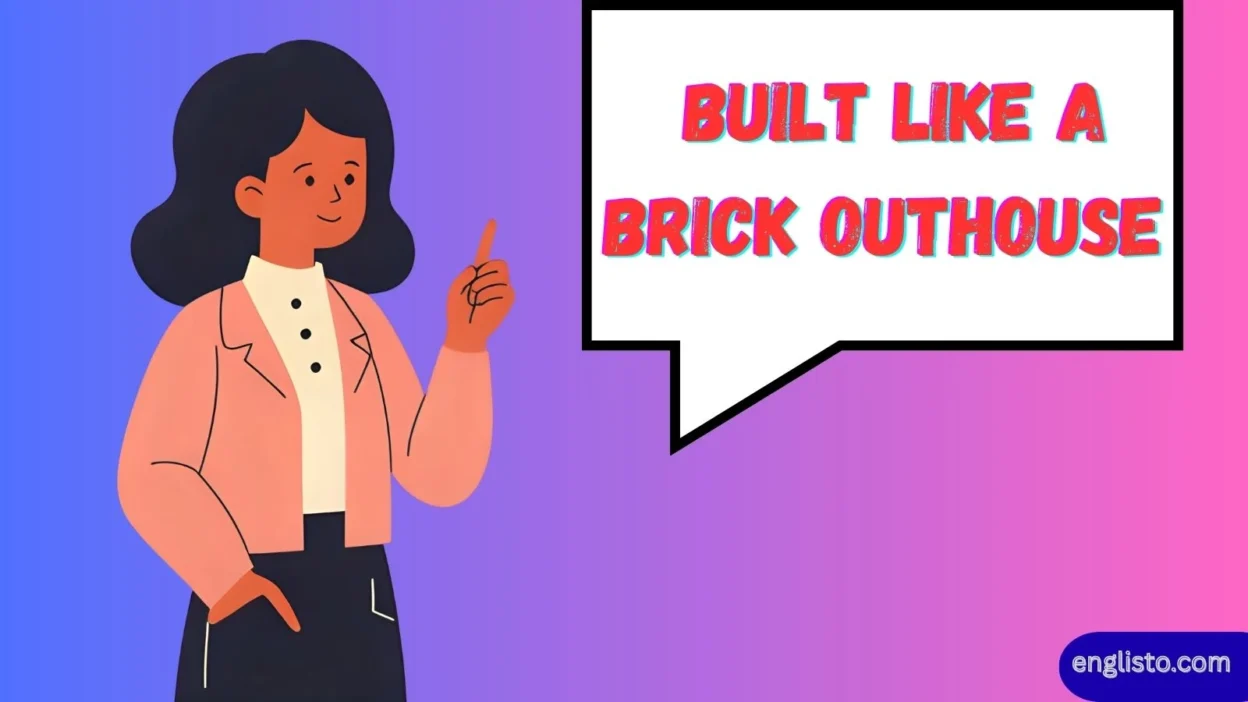Language is full of colorful phrases that paint vivid pictures in our minds. One such expression is “built like a brick outhouse.” This idiom carries a punch, evoking images of strength, durability, and solid construction. It’s been around for decades, used both as a compliment and sometimes as a tongue-in-cheek remark. Whether describing a muscular man, a curvy woman, a sturdy building, or even a reliable piece of furniture, this phrase has layers of meaning worth unpacking. Built Like a Brick Outhouse .
In this article, we’ll dive deep into its origin, usage, cultural significance, synonyms, and real-world examples. By the end, you’ll not only understand the idiom but also feel confident using it naturally in conversation.
What Does “Built Like a Brick Outhouse” Mean?
At its core, the phrase means extremely strong, sturdy, or solidly built. It can apply to both people and objects.
- For people: It usually refers to someone with a powerful, muscular build—a man who looks like a wrestler, football player, or weightlifter. In some contexts, it’s used to describe a woman with voluptuous curves, though that usage can be cheeky or even rude depending on tone.
- For objects: It emphasizes durability—something that’s well-constructed, virtually indestructible, and built to last. Think of an oak table that could survive a hundred years or a car that feels “built like a tank.”
In short: It’s about solidity and resilience—whether in bodies, buildings, or things.
Read More: Hair of the Dog – Idiom: Meaning, Origins, and Modern Use
The Literal Side: Why a Brick Outhouse?
An outhouse is an outdoor toilet, common in rural areas before indoor plumbing became widespread. Most outhouses were cheaply made from wood, scraps, or ramshackle materials—practical but flimsy. A brick outhouse, however, was different.
- Brick construction meant sturdiness and permanence.
- Unlike wood, brick didn’t rot easily or collapse in storms.
- A brick outhouse was overbuilt for its purpose, almost absurdly so.
That exaggeration is exactly what makes the idiom powerful. Something as humble as a toilet, when built with bricks, symbolized unnecessary but impressive durability.
Origins of the Idiom
The idiom has roots in 20th-century English-speaking cultures, especially in the United States, UK, and Australia.
- 1930s–1950s: Soldiers, construction workers, and blue-collar communities popularized the phrase. It often carried a bit of vulgar humor (the original form “brick shithouse” was considered crude).
- North America: Became a colloquial compliment for strong men or attractive women.
- Australia and the UK: Used more for rugged strength and less often for female attractiveness.
It spread through slang, pop culture, and music, cementing itself as a vivid metaphor.
Positive and Negative Nuances
Like many idioms, context is everything.
- Positive Uses:
- Complimenting a wrestler: “He’s built like a brick outhouse—nothing can knock him down.”
- Admiring durability: “This garage is built like a brick outhouse. It’ll outlast us all.”
- Complimenting a wrestler: “He’s built like a brick outhouse—nothing can knock him down.”
- Negative or Vulgar Uses:
- Sometimes it sounds crude, especially when applied to women.
- The raw version “brick shithouse” might be offensive in formal settings.
- Sometimes it sounds crude, especially when applied to women.
So, while it can mean admiration, it can also shock or amuse, depending on audience and delivery.
Synonyms and Related Expressions
The English language is packed with ways to describe toughness, strength, or solidity.
| Expression | Meaning | Example |
| Built like a tank | Strong, heavy, durable | “That old car is built like a tank.” |
| Well-built | Muscular, sturdy | “She admired his well-built physique.” |
| Rock solid | Reliable, unshakable | “Their friendship is rock solid.” |
| Sturdy | Firm, not easily broken | “These chairs are sturdy and built to last.” |
| Robust | Strong in design or health | “He’s got a robust body thanks to training.” |
Idioms often echo each other, but “brick outhouse” carries a unique mix of humor and admiration.
Idiom in Pop Culture
This phrase pops up in surprising places:
- Music: The Commodores’ 1977 hit “She’s a Brick House” played with the idiom to describe a woman’s curves and strength, turning it into a funky compliment.
- Movies & TV: Characters in comedies and war films often use it for comic exaggeration.
- Sports Commentary: Athletes, especially in football or wrestling, are praised this way for their massive builds and stamina.
Pop culture helped soften the vulgar edge, making it more mainstream.
Real-Life Usage Examples
Here’s how the idiom naturally slips into conversation:
- At the gym: “Man, after six months on that workout regimen, you’re built like a brick outhouse.”
- About a building: “This old farmhouse is built like a brick outhouse—it’s survived every storm since 1903.”
- Describing a person: “Her new boyfriend? Six foot four, muscle everywhere, built like a brick outhouse.”
- Furniture praise: “That oak table? Built like a brick outhouse. It’ll last a hundred years.”
Gender and Cultural Applications
- Men: The idiom often celebrates raw masculinity, power, and toughness. Wrestlers, construction workers, and athletes fit this description.
- Women: Usage can be complimentary or objectifying. In some cultures, saying a woman is built like a brick outhouse might mean voluptuous, curvy, or strikingly solid, but it can sound rude if tone isn’t careful.
- Cultural Differences:
- In the UK, it leans toward describing structures and men.
- In the US, all genders get the label (sometimes humorously).
- In Australia, it’s more blunt, often tied to rugged toughness.
- In the UK, it leans toward describing structures and men.
Grammar and Language Notes
- Form: Always an adjective phrase.
- Variants:
- “Built like a brick shithouse” (cruder form)
- “Built like a brick house” (milder, more common in polite company)
- “Built like a brick shithouse” (cruder form)
- Placement: Works best after a linking verb (is, looks, feels).
Examples:
- “He is built like a brick outhouse.”
- “That thing feels built like a brick outhouse.”
Figurative Power and Symbolism
The strength of this idiom lies in its visual and cultural symbolism:
- Brick = durability, permanence, strength.
- Outhouse = humble, functional, unglamorous.
- Combination = something unnecessarily but impressively solid.
It’s a metaphor for resilience in life: just as a brick outhouse withstands storms, a person or object described this way can endure hardship.
Idiom Comparisons in Other Languages
Many cultures have their own ways of praising strength and sturdiness.
| Language | Expression | Translation |
| Arabic | قوي البنية | Strong build |
| Hindi | मजबूत काया वाला | Muscular body |
| French | robuste | Robust |
| German | kräftig | Strong, vigorous |
| Japanese | がっしりした | Solidly built |
| Russian | крепкий | Tough, sturdy |
| Spanish | fornido | Well-built, muscular |
This shows the universal appreciation for strength across languages.
Practical Everyday Uses
Where can you drop this idiom naturally?
- Complimenting friends: after a workout or sports game.
- Describing durability: for cars, tools, or old furniture.
- Storytelling: to make anecdotes more vivid.
- Writing: adds color to fiction, journalism, or casual blogs.
Because it’s slightly cheeky, it often lightens the mood in conversation.
FAQs about “Built Like a Brick Outhouse”
Q1. Is the idiom offensive?
It can be—especially in its original “shithouse” form or when applied to women in the wrong context. Tone and audience matter.
Q2. Can it describe objects, not people?
Yes! It’s often used for houses, cars, furniture, or tools that are sturdy and reliable.
Q3. What’s the difference between “brick outhouse” and “brick house”?
“Brick house” is milder and often heard in music or casual speech. “Brick outhouse” feels more rugged and exaggerated.
Q4. Is it still common today?
Yes, though less than mid-20th century. It’s still heard in sports commentary, construction circles, and casual conversation.
Q5. Is there a polite alternative?
Yes—say “built like a tank,” “well-built,” or “solidly constructed” when you want the meaning without the vulgar edge.
Conclusion
The idiom “built like a brick outhouse” packs humor, admiration, and vivid imagery into just a few words. Rooted in working-class slang, it’s survived decades of cultural shifts and still resonates today. Whether describing a football player’s muscular body, a curvy woman’s striking figure, a sturdy building, or a piece of furniture that feels indestructible, the phrase conveys strength, resilience, and reliability.
It may be cheeky, sometimes crude, but its figurative depth and cultural legacy make it one of the most colourful idioms in the English language. Next time you want to emphasize toughness or durability—with a wink or a grin—this is the perfect phrase to reach for.



